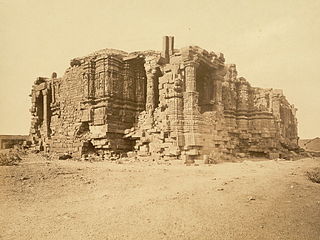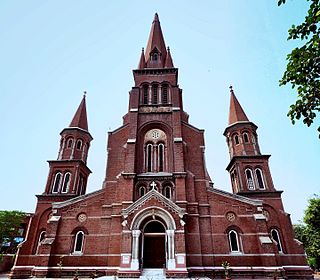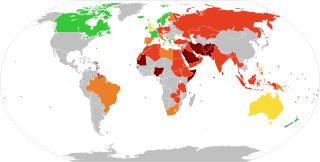
Religious intolerance is intolerance of another's religious beliefs or practices or lack thereof.

Formally, Freedom of religion in Pakistan is guaranteed by the Constitution of Pakistan for individuals of various religions and religious sects.
Persecution of Christians in the post–Cold War era refers to the persecution of Christians from 1989 to the present. Part of a global problem of religious persecution, persecution of Christians in this era is taking place in Africa, the Americas, Europe, Asia and Middle East.
Pakistan has various religious minorities. According to the 1941 census of India, there were 5.9 million, non-Muslims in the territories that came to form Pakistan in 1947 (West Pakistan and East Pakistan. During and after Pakistan's independence in 1947, about 5 million Hindus and Sikhs emigrated to India, with Punjab alone accounting for migration of 3.9 million people. According to the 1951 census conducted by the Government of Pakistan, Pakistan had 1.6% Hindu population.In East Pakistan, the non-Muslims comprised 23.2% of the total population.

Christianity is the third largest religion in Pakistan. According to the 2017 Census, the proportion of Christians in Pakistan was estimated as about 1.27% of the population. Of these, approximately half are Catholic and half Protestant. A small number of Eastern Orthodox Christians, and Oriental Orthodox Christians also live in Pakistan.

The situation of Human Rights in Pakistan is complex as a result of the country's diversity, large population, its status as a developing country and a sovereign Islamic democracy with a mixture of both Islamic and secular law. The Constitution of Pakistan provides for fundamental rights. The Clauses also provide for an independent Supreme Court, separation of executive and judiciary, an independent judiciary, independent Human Rights commission and freedom of movement within the country and abroad. However these clauses are not respected in practice.

The Catholic Church in Pakistan is part of the worldwide Catholic Church, under the spiritual leadership of the pope in Rome.

The Pakistan Penal Code, the main criminal code of Pakistan, punishes blasphemy against any recognized religion, providing penalties ranging from a fine to death. According to the US Commission on International Religious Freedom, around 80 people are known to be incarcerated in Pakistan on blasphemy charges — half of those face life in prison or the death penalty. From 1967 to 2014, over 1,300 people were accused of blasphemy, with Muslims constituting most of those accused. According to human rights groups, blasphemy laws in Pakistan have been exploited not only for persecuting minorities but also for settling personal rivalries, often against other Muslims. Though no judicial execution has been carried out under these laws, many of those accused, their lawyers and any persons speaking against blasphemy laws and proceedings have become victims of lynchings or street vigilantism in Pakistan. More than 75 people were murdered for blasphemy between 1987 and 2017.

Blasphemy in Islam is impious utterance or action concerning God, but is broader than in normal English usage, including not only the mocking or vilifying of attributes of Islam but denying any of the fundamental beliefs of the religion. Examples include denying that the Quran was divinely revealed, the prophethood of one of the Islamic prophets, insulting an angel, or maintaining God had a son.

Holy See–Pakistan relations are foreign relations between Pakistan and the Holy See. Both countries established diplomatic relations in 1961. The Holy See has a nunciature in Islamabad. Pakistan's embassy in Switzerland is accredited to the Holy See.

A blasphemy law is a law prohibiting blasphemy, where blasphemy is the act of insulting or showing contempt or lack of reverence to a deity, or sacred objects, or toward something considered sacred or inviolable. According to Pew Research Center, about a quarter of the world's countries and territories (26%) had anti-blasphemy laws or policies as of 2014.
The 2009 Gojra riots were a series of attacks targeting Christians in Gojra town in Punjab province of Pakistan. These resulted in the deaths of eight Christians including four women and a child.

Catholic (National) Commission for Justice and Peace (NCJP) was formed in 1985 by the Catholic Bishops' Conference of Pakistan. It provides services in the field of human rights advocacy.
In 2010, a Pakistani Christian woman, Aasiya Noreen, commonly known as Asia Bibi or Aasia Bibi, was convicted of blasphemy by a Pakistani court and was sentenced to death by hanging. In October 2018, the Supreme Court of Pakistan acquitted her based on insufficient evidence, though she was not allowed to leave Pakistan until the verdict was reviewed. She was held under armed guard and was not able to leave the country until 7 May 2019; she arrived in Canada the next day.

Clement Shahbaz Bhatti, popularly known as Shahbaz Bhatti, was a Pakistani politician who was elected as a member of the National Assembly from 2008. He was the first Federal Minister for Minorities Affairs from November 2008 until his assassination on 2 March 2011 in Islamabad and the only Christian in the Cabinet. Tehrik-i-Taliban Pakistan claimed responsibility for his killing and called him a blasphemer of Muhammad. In March 2016, five years after the death of Shahbaz Bhatti, his cause for beatification was formally opened by the Roman Catholic Diocese of Islamabad-Rawalpindi, making him a Servant of God within the Roman Catholic Church.

The Ministry of Minorities used to be a federal-level ministry in the Government of Pakistan. The head of the ministry was known as the Minister for Minorities and was a member of the federal cabinet.
Religious discrimination in Pakistan is a serious issue for the human rights situation in modern-day Pakistan. Hindus, Christians, Sikhs, Shias, and Ahmadis among other religious minorities often face discrimination and at times are even subjected to violence. In some cases Christian churches and Ahmadi mosques and the worshippers themselves have been attacked. Khawaja Nazimuddin, the 2nd Prime Minister of Pakistan, stated: "I do not agree that religion is a private affair of the individual nor do I agree that in an Islamic state every citizen has identical rights, no matter what his caste, creed or faith be".
Rimsha Masih is a Pakistani girl from Islamabad, who was arrested by the Pakistani police on blasphemy charges in August 2012 when she was 14 years old. The alleged charges included desecrating pages of the Quran by burning—a crime punishable by death under Pakistan's blasphemy law. She is a member of Pakistan's Christian minority.

Dr. Paul Jacob Bhatti Italian national. He is a politician and well-known surgeon. He is the former federal minister in charge of National Harmony and Minorities Affairs. He served as a minister in the government of President of Pakistan Asif Ali Zardari.











